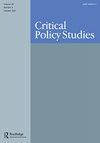Making sense of pot: conceptual tools for analyzing legal cannabis policy discourse
IF 2.4
3区 社会学
Q1 Social Sciences
引用次数: 3
Abstract
ABSTRACT In the last decade, there has been a significant surge in cannabis legalization, with Uruguay (2013), Canada (2018) and 19 U.S. states (2012-2022) having developed recreational cannabis policies. A growing literature analyzes legalization from a policymaking or public health standpoint. Yet only few studies have explored its discursive component . This article contributes to filling this gap by developing conceptual tools for cannabis policy discourse analysis. I first examine the history of cannabis policy in North America and find two main discursive clusters, i.e., moral and epistemic discourse. I then discuss existing typologies of cannabis regulation models and select that of Beauchesne, which distinguishes between three models: prohibition 2.0, public health and harm reduction, and commercialization. At the intersection of discursive clusters and these regulation models, I identify six mutually exclusive frames of cannabis policy: moral panic, medical/health, reparations/vulnerabilities, harm reduction/risk mitigation, laissez-faire/liberalism, and illicit market/revenue.理解大麻:分析合法大麻政策话语的概念工具
在过去的十年中,大麻合法化的数量大幅增加,乌拉圭(2013年)、加拿大(2018年)和美国19个州(2012-2022年)都制定了娱乐性大麻政策。越来越多的文献从政策制定或公共卫生的角度分析大麻合法化。然而,只有少数研究探讨了它的话语成分。本文通过开发大麻政策话语分析的概念工具来填补这一空白。我首先研究了北美大麻政策的历史,发现了两个主要的话语集群,即道德和认知话语。然后,我讨论了大麻管制模式的现有类型,并选择了Beauchesne的模式,它区分了三种模式:禁止2.0、公共卫生和减少危害以及商业化。在话语集群和这些监管模式的交叉点上,我确定了大麻政策的六个相互排斥的框架:道德恐慌、医疗/健康、赔偿/脆弱性、减少伤害/减轻风险、自由放任/自由主义和非法市场/收入。
本文章由计算机程序翻译,如有差异,请以英文原文为准。
求助全文
约1分钟内获得全文
求助全文

 求助内容:
求助内容: 应助结果提醒方式:
应助结果提醒方式:


